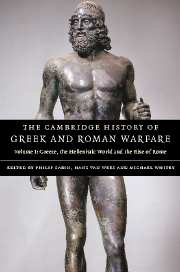Book contents
- Frontmatter
- Introduction: The Historiography of Ancient Warfare
- Part I Archaic and Classical Greece
- 4 International relations
- 5 Military forces
- 6 War
- 7 Battle
- 8 Warfare and the state
- 9 War and society
- Part II The Hellenistic World and the Roman Republic
- Chronological Table
- Glossary
- List of Ancient Authors
- Bibliography
- Index of ancient passages cited
- General index
- Map 1 The western Mediterranean
- Map 3 The Near East
- References
4 - International relations
from Part I - Archaic and Classical Greece
Published online by Cambridge University Press: 28 March 2008
- Frontmatter
- Introduction: The Historiography of Ancient Warfare
- Part I Archaic and Classical Greece
- 4 International relations
- 5 Military forces
- 6 War
- 7 Battle
- 8 Warfare and the state
- 9 War and society
- Part II The Hellenistic World and the Roman Republic
- Chronological Table
- Glossary
- List of Ancient Authors
- Bibliography
- Index of ancient passages cited
- General index
- Map 1 The western Mediterranean
- Map 3 The Near East
- References
Summary
conceptualizing international relations
It is perhaps to be regretted that we no longer possess the treatise that the fourth-century Athenian philosopher and statesman, Demetrius of Phalerum, is supposed to have penned on the subject of international relations. If he owed any intellectual debt in this regard to Aristotle (whose pupil Theophrastus had advised Demetrius during the ten years that he ruled Athens as a Macedonian puppet), it is likely that the polis constituted his primary level of analysis. Certainly, in general accounts of Greek history today the origins and nature of the polis are almost invariably discussed prior to the protocols that governed relations between states. International relations are conceived as the political outcomes of interaction between individual states, each already endowed with a specific identity, interests and agendas, and the external behaviour that is exhibited by such states is conditioned by the internal or domestic structures that pertain in each case. Thus, in Thucydides’ scheme of things, the conservative and archaizing tendencies of the Spartan state predispose it to launch old-fashioned infantry raids on Attica in the early years of the Peloponnesian War, while the disastrous Athenian expedition to Sicily in 415 BC is the inevitable over-reach of a maritime imperialist ideology inextricably linked with the radical democracy.
Yet in some respects this ‘atomistic’ model of international relations (the metaphor sometimes used is of ‘colliding billiard balls’) is not entirely satisfactory. First, it is clear that there was interaction among communities prior to the emergence of the polis – a process that was undoubtedly long and gradual but in terms of proto-urban nucleation, consolidation of territory and the formation of a ‘closed’ political community was already under way by c. 750.
Keywords
- Type
- Chapter
- Information
- The Cambridge History of Greek and Roman Warfare , pp. 83 - 107Publisher: Cambridge University PressPrint publication year: 2007

